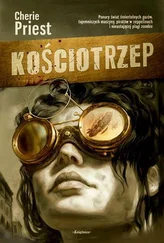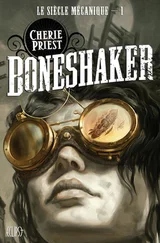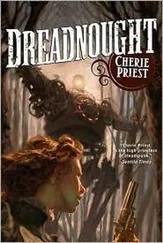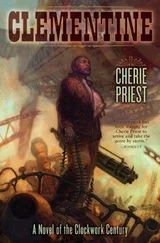“Dr. Wellers was just about to go looking for you.”
“So he says.”
The doctor went to the nearby liquor cabinet and poured himself a stiff draught of very good bourbon, then offered one to Gideon, too. He shifted his bundle of paper and accepted the glass, knowing better than to hope it’d warm his feet, but appreciating the gesture. The beverage and the crystal service set beside it were a gift from a French ambassador, and easily worth more than his niece. He knew, because ten years ago he’d bought her freedom when he couldn’t steal it. The cost of the furnishings could have brought many more families across the line. The math filled his head but did not make it spin. Very few things could accomplish such a feat, least of all numbers.
Gideon downed the drink and watched the new electric lights sparkle through the damp crystal.
One of Polly’s fluttering, fretful hands touched his arm. “What happened out there?” she asked. “Can I help you with your … with this … package?”
“No, Polly. I’ve got it under control. Two men broke in,” he answered her first question, handing the glass back to Nelson and glancing at his feet. He still couldn’t feel them, but he watched as they dripped and oozed a large damp spot on a very expensive rug from somewhere in the Ottoman empire.
“Are you sure you aren’t hurt?” the doctor tried again, scrutinizing Gideon with a professional appraisal that was already telling him that all was well. “Can Polly take your coat?” he asked, his dubious tone suggesting he already knew the answer to that, too.
“No,” Gideon replied, a little too quickly. “No, I’ll just sit a minute by the fire, if you don’t mind. I need to see Mr. Lincoln.” He squeezed the printout. It felt strange, like it had shrunk on the way from the hospital. But it’d only become crushed as he’d kneaded it down, over and over again, making sure he didn’t drop it. “He needs to see this. This is what they came for.”
He barely heard the faint motor hum of the president’s chair approaching, but he did hear it because he expected it, and he listened for it.
Nelson Wellers stood aside, and Polly withdrew to the edge of the room. Gideon stayed where he was, and the sixteenth president of the United States rolled into their midst.
His chair was a marvel of science, the only one of its kind. Propelled by an electric motor, it was manipulated with small levers and buttons, customized for the old man’s long, slender hands. Those fingers, which had once signed laws into being, were crumpled now, bending and unbending only with great effort; but they were firm on the steering paddle as he brought himself forward.
This was the man who would’ve freed Gideon’s family, if he’d had the chance. If the bullet hadn’t blown his head almost in two, leaving him a stiff, twisted figure made of scars and odd angles. He was a hero. That made Gideon a hero by proxy, so far as his mother and brothers were concerned. His mother told everyone about it: how her boy worked hand in hand with the great leader, coming into his house through the front door like a proper gentleman. Her gushing pride embarrassed him for complicated reasons—reasons he never shared, because they would’ve only confused her.
Abraham Lincoln gazed levelly at the scientist with his one good eye. “Gideon, you did it.”
Not a question, but a statement of certainty. Abraham Lincoln liked to be certain, almost as much as Gideon did.
“Yes sir, but this is all I could save. I needed more time.”
“We always do.” The former president nodded solemnly, his thin frame bobbing softly in the narrow black suit he so often wore. “It will have to be enough.” He gestured toward the library, and turned the chair to face it. “Polly,” he called over his shoulder. “Could you bring Dr. Bardsley a pair of slippers? Something from my closet, to wear until his boots are dry.”
“Yes, sir. I will, sir.”
To Gideon, he said, “You can take those off, and we’ll put them by the fire. Your feet must be miserable.”
“Yes, they are. Thank you, sir.” He followed the chair he’d helped build, and Nelson Wellers fell into step beside him.
Speaking over his shoulder again, for he could not easily turn his head, Mr. Lincoln said, “I’m glad to see you escaped unscathed, Gideon. When we got word of the blast, I feared the worst. But Ephraim said he didn’t see any sign of you, not in the rubble—or in the basement either, when he dropped a lantern down there. You barely missed one another. He rode out on horseback and only just returned. You made awfully good time on those frozen feet of yours.”
Gideon didn’t hear any of it after the part about the lantern. “The basement? So the floor held? Is the Fiddlehead intact?”
“The floor held. Your printing apparatus is so much scrap metal, I’m afraid, but as for the Fiddlehead, I do not know. Ephraim couldn’t say. There was a great deal of debris, and dust, and smoke too, I think. There was a small fire, but it was quickly brought under control.”
“But there’s a chance…?”
“There’s always a chance.” He reached the library and maneuvered the chair through its doorway. “But we won’t know anything until morning, so let’s not worry about what we cannot change. For now, I want you to show me what you were able to save. And then, of course, you must tell me what it means. ”
President Ulysses S. Grant shook his head and watched his watery reflection quiver in the glass of Kentucky whiskey. He had better beverages on hand—more expensive beverages, at least—but he picked one of his finer bourbons for the other man, who barely sipped it. What a waste. He should’ve kept it for himself.
“I don’t like it when you talk in absolutes. It usually bodes ill.” He kept his eyes trained on the glass while he waited for a response, because the glass was more likely to tell the truth.
Desmond Fowler leaned in close, trying to force the president’s eye contact and failing. He gave up and withdrew into his narrow seat. It wasn’t intended to be comfortable. Grant didn’t want him to stay.
“Freedom and slavery are absolutes. War and peace.”
“You’re wrong about all four.” Grant swallowed the last of his drink, but neither put the glass aside nor filled it again. He held it firmly, lest his hands shake. They often shook these days. He called it nerves or exhaustion. “But these two things are true, Fowler: They can’t hold on much longer, and neither can we.”
“You’re wrong about both, if I may be so bold.”
“I’ve never stopped you yet, even when I should have.”
Grant looked up in time to see him frown. “Sir, the program is vital to—”
“The survival of the nation, yes, as you’ve said. But we’re fooling ourselves if that’s what we’re out to save. The nation has been lost for years. Maybe even since the war began. You could make a case for that.”
“And you’ve done so. But now we’re arguing semantics.”
“So we’ll argue, then. We can’t save the United States; we can only reconstruct it. And we can’t do that until we wrap up this damn war.”
“Which is why I—”
The president slammed down his glass. “I don’t like the program,” he said bluntly.
“And I don’t like the war,” Fowler replied. “I thought you didn’t, either.”
It took all Grant’s strength to keep from calling him a liar. If he’d been a bit more sober, or a bit younger, or a bit less alone in a quiet room with a man he could not trust, he might’ve done so. Instead he calmed down and forced himself to breathe.
He rubbed at his eyes until they were red, then folded his arms and matched Fowler’s stare. “I hate it. But this is what it comes down to: Do we hate the war more than we love our country?”
Читать дальше










